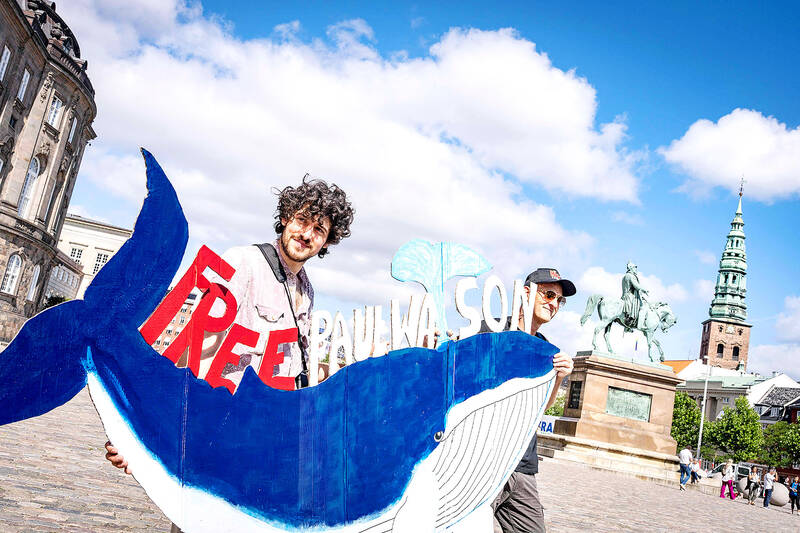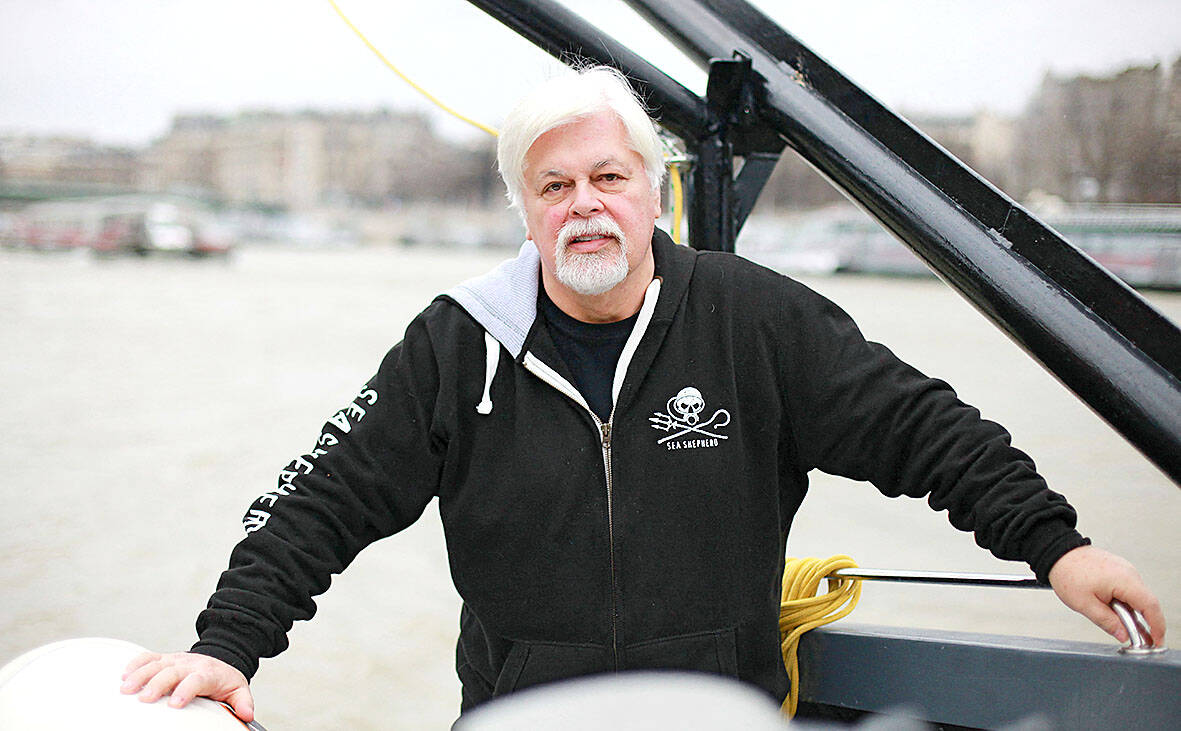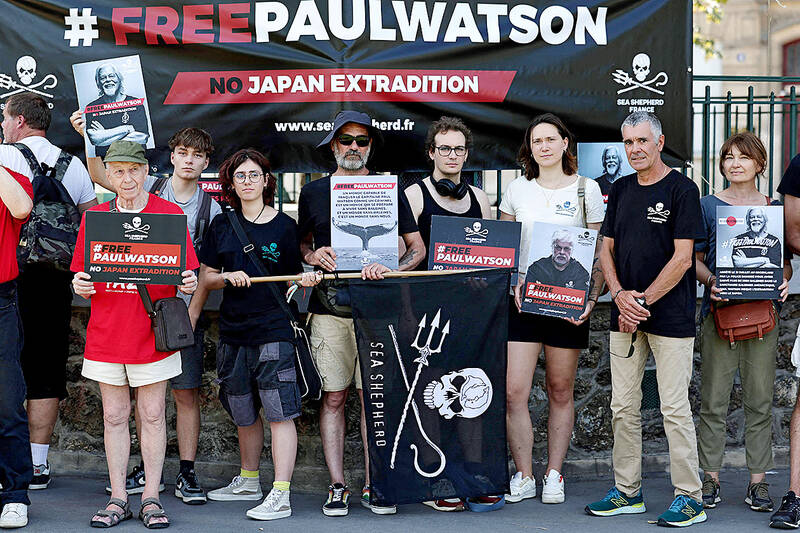For years a bete noire of Japan, one of the last three countries along with Iceland and Norway to practice commercial whale hunting, Watson was arrested on July 21 in Greenland, an autonomous Danish territory.
The 73-year-old American-Canadian was arrested under an Interpol “red notice” issued by Japan. A Greenland court will tomorrow hold a hearing to decide whether to extend his detention pending the request.
Brigitte Bardot, the French screen legend turned animal rights activist, rushed to his defense, telling the daily newspaper Le Parisien that the Japanese government had “launched a global manhunt” against Watson, who was “caught in the trap.”

Photo: AFP
Emmanuel Macron, the president of France, where Watson has lived for the past year, also pressed Danish authorities not to extradite the campaigner, according to his office.
PIRATE OF COMPASSION
Watson devoted himself to saving marine life in 1977, forming what would become the Sea Shepherd Conservation Society. He was dismissed from the group in 2022 after in-fighting, which he said left a bitter taste. Some branches of the association, including that of France, continue to support him.

Photo: AFP
Before then he had spent time with the Canadian Coast Guard and Norwegian and Swedish merchant marine ships.
Over the years he has become a familiar face in the media, appearing in the reality TV series Whale Wars and well-known for his innovative direct action tactics: chasing, harassing, scuttling and ramming illegal whaling and fishing vessels.
“We are pirates of compassion hunting down and destroying pirates of profit,” Sea Shepherd’s Web site quotes him as saying.

Photo: AFP
He uses acoustic weapons, water cannon and stink bombs against whalers.
Employing these methods, he has sunk more than a dozen boats and raided just as many.
As a campaigner, he has drawn on his degree in communications, galvanizing support and funding from stars including longtime patron Bardot, Sean Penn, Pierce Brosnan and Pamela Anderson.
FROM BEAVERS TO WHALES
Born in Toronto in 1950, the eldest of seven children, Watson grew up in a fishing village in New Brunswick in eastern Canada. He lost his mother when he was 13 and two years later he left home after falling out with his father.
His passion for whales was sparked in 1975, he says, when he was caught in a standoff with Soviet whalers and looked a dying whale in the eye.
“If we cannot save the whales, turtles, sharks, tuna and complex marine biodiversity, the oceans will not survive,” he said in a Web interview in 2017.
“And if the oceans die, humanity will die, for we cannot survive on this planet with a dead ocean.”
ECO-TERRORIST
Over 45 years, the intrepid captain has carried out spectacular operations from Siberia to Iceland, Norway, the Faroe Islands and Japan.
With his crews he has saved thousands of whales and spotlighted the illegal activities of whalers.
In 2010 Sea Shepherd clashed violently with Japanese boats, leading to the sinking of the organization’s high-tech super boat Ady Gil in the remote Southern Ocean.
Tokyo has accused him of causing injury and damage to one of its whaling ships in the Antarctic in 2020.
He regularly says in interviews “we’ve never injured anybody.” At the time, Japanese ships hunted whales in the Antarctic and North Pacific for what it said were scientific purposes.
BATTLES ON SEA AND LAND
The white-bearded father of three claims in his biography to have co-founded Greenpeace in 1972 but said he parted ways with the group over arguments about protest tactics.
His ex-allies, and also the Japanese government, label him an “Eco-terrorist” because of his radical tactics.
He was detained for several months in the Netherlands in 1997 and lived in exile on the high seas from 2012 to 2014.
His next battle is in court.
He was arrested on the John Paul DeJoria in Greenland as the ship was headed to “intercept” Japan’s new whaling factory vessel in the North Pacific, his foundation said.

In the March 9 edition of the Taipei Times a piece by Ninon Godefroy ran with the headine “The quiet, gentle rhythm of Taiwan.” It started with the line “Taiwan is a small, humble place. There is no Eiffel Tower, no pyramids — no singular attraction that draws the world’s attention.” I laughed out loud at that. This was out of no disrespect for the author or the piece, which made some interesting analogies and good points about how both Din Tai Fung’s and Taiwan Semiconductor Manufacturing Co’s (TSMC, 台積電) meticulous attention to detail and quality are not quite up to

April 21 to April 27 Hsieh Er’s (謝娥) political fortunes were rising fast after she got out of jail and joined the Chinese Nationalist Party (KMT) in December 1945. Not only did she hold key positions in various committees, she was elected the only woman on the Taipei City Council and headed to Nanjing in 1946 as the sole Taiwanese female representative to the National Constituent Assembly. With the support of first lady Soong May-ling (宋美齡), she started the Taipei Women’s Association and Taiwan Provincial Women’s Association, where she

Chinese Nationalist Party (KMT) Chairman Eric Chu (朱立倫) hatched a bold plan to charge forward and seize the initiative when he held a protest in front of the Taipei City Prosecutors’ Office. Though risky, because illegal, its success would help tackle at least six problems facing both himself and the KMT. What he did not see coming was Taipei Mayor Chiang Wan-an (將萬安) tripping him up out of the gate. In spite of Chu being the most consequential and successful KMT chairman since the early 2010s — arguably saving the party from financial ruin and restoring its electoral viability —

It is one of the more remarkable facts of Taiwan history that it was never occupied or claimed by any of the numerous kingdoms of southern China — Han or otherwise — that lay just across the water from it. None of their brilliant ministers ever discovered that Taiwan was a “core interest” of the state whose annexation was “inevitable.” As Paul Kua notes in an excellent monograph laying out how the Portuguese gave Taiwan the name “Formosa,” the first Europeans to express an interest in occupying Taiwan were the Spanish. Tonio Andrade in his seminal work, How Taiwan Became Chinese,